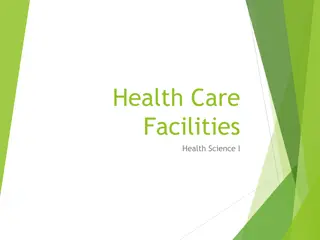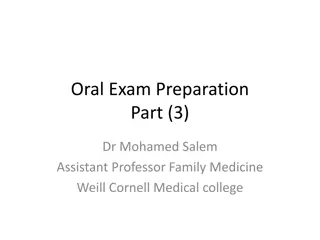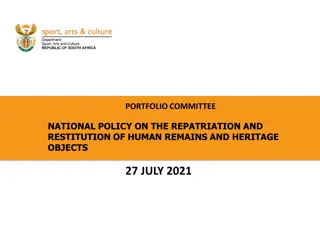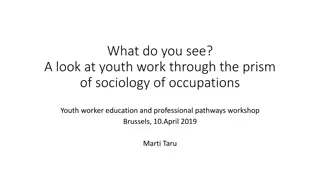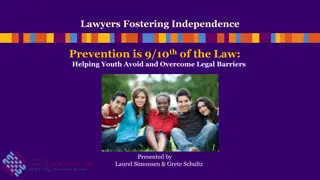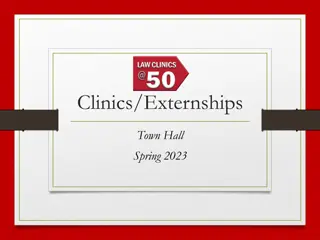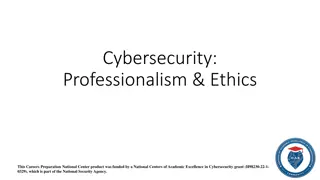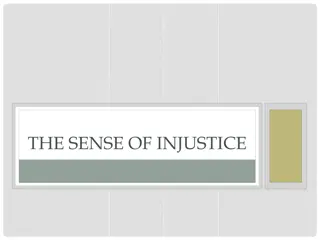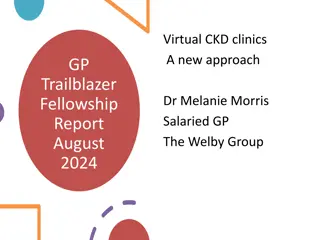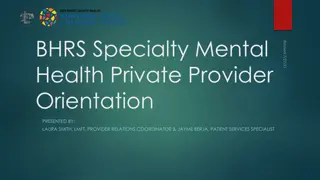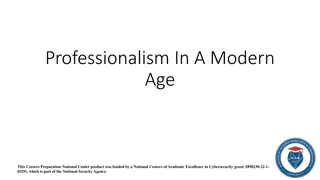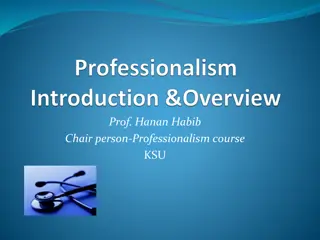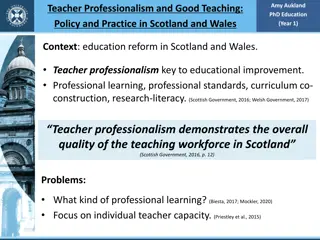Exploring Legal Clinics: Redressing Injustice and Fostering Professionalism
Legal clinics, such as the one run by the Centre for Legal Aid and Mediation (CLAM), serve the public interest by addressing access to justice issues for vulnerable populations. These clinics aim to redress inequality, cultivate professionalism, and strengthen the rule of law. By providing practical experience to law students and promoting the value of public service, legal clinics play a crucial role in promoting social responsibility within the legal profession.
Download Presentation

Please find below an Image/Link to download the presentation.
The content on the website is provided AS IS for your information and personal use only. It may not be sold, licensed, or shared on other websites without obtaining consent from the author. Download presentation by click this link. If you encounter any issues during the download, it is possible that the publisher has removed the file from their server.
E N D
Presentation Transcript
1 LEGAL CLINIC Year 3/Law (2022-2023) By Dr Marie Rose Turamwishimiye
General Introduction 2 Legal clinic or law clinic simply means: a non-profit law practice unit that serves the public interest. putting law school students theoretical information into practice a practical method of teaching which allows to actively work on real cases and be involved in legal aid activities. Year 3/Law (2022-2023) By Dr Marie Rose Turamwishimiye
Objectives of Legal Clinic 3 The Legal Clinic has the following main objectives: 1. Redressing injustice Legal clinic mainly helps to serve vulnerable people suffering from poverty and lack of access to justice. When these people are assisted, it shows that legal clinic can be a tool for redressing inequality and injustice. 2. Fostering Professionalism and a Sense of Public Service From the legal clinic, those involved get a foundation of professionalism and dedication to public service. Having contacts with clients and encountering with social issues of critical concern contributes to the internalization of the value of public service and the value of working for the public interest. Legal clinic therefore allows to develop a more socially responsible legal profession. Year 3/Law (2022-2023) By Dr Marie Rose Turamwishimiye
(Cont) 4 3. Strengthening the rule of law The legal clinic helps to train professionals dedicated to upholding the rule of law and promotes the idea that disputes can be resolved fairly and peacefully by using the law. When clients come to a clinic they get more than help with a specific justice problem, they get a firsthand look at how the rule of law functions. Year 3/Law (2022-2023) By Dr Marie Rose Turamwishimiye
5 Legal Clinic is run by the Centre for Legal Aid and Mediation (CLAM) The Centre emerged from the former Legal Aid Clinic (LAC) which was initiated and created by the Faculty of Law of the former National University of Rwanda, as its operational arm to achieve the University s third mission: service to the community. The Legal Aid Clinic was the first to be known in Rwanda (2001) and was established with three main objectives: to educate, to serve the community and to be a research machinery. Year 3/Law (2022-2023) By Dr Marie Rose Turamwishimiye
(Cont) 6 The Legal Aid Clinic became CLAM in 2013. CLAM s mission Its mission is rooted in the belief that access to justice should not be a prerogative of those who can only afford it, but rather justice should be accessible to those in need. Year 3/Law (2022-2023) By Dr Marie Rose Turamwishimiye
(Cont) 7 CLAM therefore continues to provide law students with an introduction to legal aid work and an exposure to legal practice as well as an introduction to providing legal advisory service to Rwandan people especially the community in the surroundings of the University, in order to help them get easy access to justice. Year 3/Law (2022-2023) By Dr Marie Rose Turamwishimiye
(Cont) 8 CLAM s objectives: The objectives continue to be comprised of providing legal education, legal aid to the community and research while putting much emphasis on mediation in conflict resolution. CLAM interventions in dispute resolution In solving client s legal problems, CLAM s intervention comprises of: Mediation Legal opinion Legal advice Court s submissions Referral to other relevant institutions Letters to relevant authorities Year 3/Law (2022-2023) By Dr Marie Rose Turamwishimiye
(Cont) 9 The legal clinic course Students attend the clinic for a period of five to six weeks (every Friday of the week from 8:00 to 12:00). Students work in groups: 2 to 3 students work together under the supervision of appointed lecturers. They receive clients, listen to them, identify the legal problem and propose the right solution according to the law. They must consult the supervising lecturer before taking the final decision and communicating it to the client. At the end of the intervening period of 5 or 6 weeks, students write reports on activities they performed; which reports constitute the basis of evaluation. Year 3/Law (2022-2023) By Dr Marie Rose Turamwishimiye
10 INTERVIEWING SKILLS AND TECHNIQUES Year 3/Law (2022-2023) By Dr Marie Rose Turamwishimiye
Introduction 11 1. Are you an expert? To conduct an interview requires no much expertise. Understanding the facts combined with familiarity with rules and an understanding of court and tribunal processes and procedures is generally sufficient. The key is having the skills to draft facts and being able to translate client instructions into the relevant format in an efficient manner to provide efficient advice to the client. Year 3/Law (2022-2023) By Dr Marie Rose Turamwishimiye
(Cont) 12 Make sure you can welcome your client in a convenient place where he/she will feel comfortable and will be able to speak freely; Make sure you plan enough time for the meeting: Take some paper and something to write with you; Do not meet your client in public: Confidentiality, Your client might be less open and straightforward. Year 3/Law (2022-2023) By Dr Marie Rose Turamwishimiye
13 2. Be yourself Initially, the interviewer is required to avoid the stress, panic and start by a simple and ordinary conversation with the client; Introduce yourself, Make your client feel comfortable, Explain that everything said during the meeting will remain confidential, Show compassion but keep some distance: independence is essential, Explain that you are in first place there to listen to your client; Year 3/Law (2022-2023) By Dr Marie Rose Turamwishimiye
(Cont) 14 Be professional; -this will enable you to get the trust of your clients, - more credibility as well; It might be necessary to adapt your style to obtain better results in terms of information received from the client. Year 3/Law (2022-2023) By Dr Marie Rose Turamwishimiye
I. Interview content 15 A. Client info (i): Who is he/she? Where does he/she live? - you need to be able to contact him/her; - you should also ask whether he/she can be reached over the phone, Why does he/she need your help? How urgent is the case? [this is the question the interviewer should ask himself/herself] Who is involved in the dispute? How long has this been going on? When did it happen? Year 3/Law (2022-2023) By Dr Marie Rose Turamwishimiye
(Cont) 16 Client info (ii): Define the background of all the parties involved; - Identify the place of the event, - Find out the whole picture, - Get the knowledge of the family status, - Get the picture of the parties legal history. Year 3/Law (2022-2023) By Dr Marie Rose Turamwishimiye
(Cont) 17 B. Investigative questions: A thorough investigation requires that specific questions must be answered The lawyer s job (as investigator) consists of finding answers to questions; The 5 W and1 H -questions can be used for interviewing clients and witnesses: - Who, What, Where, When, Why and How? Year 3/Law (2022-2023) By Dr Marie Rose Turamwishimiye
II. Style and method of interview 18 A. General Let the client speak; But: keep the control of the meeting; Take notes [having an assistant to take notes may be useful: enables better eye- contact with the client] ; Propose breaks if you feel there is a need for it [tension, exhaustion ]; Independence is key; - always consider first whether you are conflicted : are you able to advise in an impartial way? - do not advise both sides unless both parties have the same interest Year 3/Law (2022-2023) By Dr Marie Rose Turamwishimiye
(Cont) 19 B. Body language Observe your client; Pay attention to your own body language; - facial expression: eye-contact, - posture: relaxed but focused, - body movements: encouraging body movements (nodding, using, your hands), - tone and volume of voice; The content of the message and body language should be consistent. Year 3/Law (2022-2023) By Dr Marie Rose Turamwishimiye
(Cont) 20 C. Behaviour Stay calm and look confident; Be kind but not too familiar; Be structured and speak clearly; Be passionate but sober; Be exhaustive and take your time; Be flexible; Avoid legal jargon as much as possible; Remain respectful when referring to the other party (do no stir up the dispute); remain as neutral as possible; Do not take a side but provide impartial and objective legal recommendations. Year 3/Law (2022-2023) By Dr Marie Rose Turamwishimiye
(Cont) 21 D. Purpose: get to the truth (i) The first step is for you to establish that the issue under investigation has occurred; The next step is to locate any physical evidence that might be available or witness; You must only use the evidence that tends to prove or disprove the matters; The evidence used to fill the gaps in the story should be consistent and conform to the truth. You should double-check all information. Year 3/Law (2022-2023) By Dr Marie Rose Turamwishimiye
(Cont) 22 Purpose: get to the truth (ii) Same if witnesses are present, try to interview them separately; Should I talk to the other people? It might sometimes be necessary to interview witnesses or victims again in light of your deductions or new evidence; Silence can be relevant as well! Year 3/Law (2022-2023) By Dr Marie Rose Turamwishimiye
(Cont) 23 E. Interviewing process (i) Get the facts right: ask more questions if they are unclear; Identify the legal issues in a systematic way; Make sure that you understood correctly what your client would like to achieve; Take notes of your client s ideas; Invite your client to reformulate his/her thoughts in case of risk of misunderstanding. Year 3/Law (2022-2023) By Dr Marie Rose Turamwishimiye
(Cont) 24 You can also rephrase your client s story in your own words to see if your client agrees (and to double-check if you have not missed anything); Prevent the client from moving away from the main issue; if this happens, ask him/her questions that will re-direct him/her to the relevant topic; Have a final catch-all question like: is there anything else you feel may be useful which you have not yet said or that I have missed out? Year 3/Law (2022-2023) By Dr Marie Rose Turamwishimiye
(Cont) 25 F. Systematically Step 1: List issues; Step 2: Categorise issues and exclude those which are not relevant for the legal assessment; Step 3: Identify the legal rules relevant to each issue; Step 4: Conclude accordingly for each of the issues raised by the client [if possible: at the meeting; if not: at a later stage Year 3/Law (2022-2023) By Dr Marie Rose Turamwishimiye
III. Providing legal advice 26 A. Some precautions Never advise the client to behave in an illegal manner (harm to reputation); Do not advise on issue you do not master; Check that there is no development (legislative or via case law) in the field you are specifically dealing with; Do not advise prematurely: if you do not feel comfortable with advising immediately, do not hesitate to take time before sharing your views; if there is an uncertainty, tell your client that you will render your advice at a later stage; Legal advice is not about you sharing your personal, political, religious views with your client; advice must be based exclusively on legal rules and be as objective as possible; the advice should not include any value judgment. Year 3/Law (2022-2023) By Dr Marie Rose Turamwishimiye
(Cont) 27 You are not obliged to take on a client: if you feel you cannot handle a case objectively, you should consider withdrawing and ask a fellow/colleague to take over; Check whether the client was already advised by a lawyer in the past (if yes, you might consider contacting your predecessor); Provide the client with your contact details (e.g. tel number, a business card, etc.) to enable him/her to contact you after the meeting; Do not hesitate to contact with fellow lawyers. Year 3/Law (2022-2023) By Dr Marie Rose Turamwishimiye
(Cont) 28 B. Avoid surprises Inform the client if the case will need to be brought before a court; Suggest alternative dispute resolution solutions such as mediation, etc.; Provide an estimate of the duration (and cost) of the discussed procedure; Provide the client with your view on the chances of success: if you think the case is very weak, do not hesitate to advise your client that he/she should probably not go ahead with legal proceedings. Year 3/Law (2022-2023) By Dr Marie Rose Turamwishimiye
(Cont) 29 C. Structure Have a structure in mind: Summary of the facts; List issues that are relevant to your advisory task; Make a distinction between major and minor issues; Make your legal assessment of the situation; What are the consequences of the assessment: legal proceedings? Required damages? Other indemnification? etc.; What are the alternatives? Provide a risk analysis; What are the next steps? Year 3/Law (2022-2023) By Dr Marie Rose Turamwishimiye
(Cont) 30 D. Decision Remember that your role stops as soon as the advice is provided: that actual decision is in the hands of your client-do not make decision on behalf of your client! Make sure there is an understanding between you and the client on next steps-it may be good to have this in writing; Make sure that the client has received a comprehensive overview of the options and their respective responses; What if the client does not accept the advice? Assessment of the reasons for rejection: - Advice was not clear; - The client has the feeling he/she is not taken seriously or is in a defensive mode; -Timing of the advice: too early or too late? - Attitude of the lawyer? Year 3/Law (2022-2023) By Dr Marie Rose Turamwishimiye
(Cont) 31 E. Message You should choose an informative way to position yourself: - I advise... - I suggest... - In my view... + Because... + This is for the following reasons... Do not be too directive: - You need to... - I want you to... Year 3/Law (2022-2023) By Dr Marie Rose Turamwishimiye


